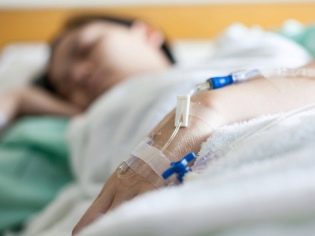Toxicosis in the first trimester of pregnancy
After the news of the upcoming motherhood, the woman usually sinks into a dreamy state. She imagines what the baby will be like, how they will walk, play, what beautiful toys he will have. But from the joyful period, the future mother can “return to the earth” early toxicosis. And you have to try to survive this unpleasant period.
What it is?
When we hear the word "toxemia", we imagine a poor pregnant woman, exhausted by nausea. However, doctors under toxicosis do not understand the specific symptoms during pregnancy, but intoxication of the body. And it can be caused not only by an “interesting” position, but also by exposure microbes, viruses, toxic substances, allergens.
If the factors acting on the body, appeared from the outside, toxicosis is called exogenous, if they are internal, formed as a result of metabolism, then toxicosis endogenous, this is precisely the condition of pregnant women in the first trimester.
After conception, progesterone is actively produced in the woman's body - a hormone that is very important for maintaining pregnancy. But it has a lot of "side" actions, which include headaches, increased saliva production and overexcitation of the vomiting center of the brain.
The mandatory signs of pregnancy toxicosis does not apply. There are quite a few women who have given birth to one, two, three or more children and have never encountered such a phenomenon as toxicosis. And there are women who can only remember one thing about their pregnancy and childbirth, the most vivid memory - a terrible, debilitating toxicosis.
Last, it should be noted, the majority. According to statistics, to varying degrees, toxicosis occurs eight out of ten women. This does not mean that the remaining two of these ten are wrong. The absence of toxicosis - the norm.
The reasons
Despite the fact that the human body is becoming less "white spots", to establish the cause of toxicosis during pregnancy, scientists thoroughly have not yet succeeded. The most likely cause is the work of a woman’s immunity. The immune system is supposed to rebel and destroy an organism that is half foreign to the genetic set (the father’s part of the genes in the embryo should recognize the immune system as alien), but it doesn’t give the immune system the ability to crack down on the embryo progesteronewhich from the first minutes after conception begins to suppress immunity.
Progesterone is a strong immunosuppressant. The process of suppression is manifested at the biochemical level, and it is the products of metabolism that cause intoxication.
Women with very strong immunity usually have no toxicosis, or it is weakly expressed. The immune system can endure the suppressive action of hormones. Accordingly, weak or weak birth immunity creates favorable conditions for the development of toxicosis.
Symptoms
The first signs of the earliest toxicosis can appear as early as the 6th week of pregnancy, that is, a few days after the onset of the delay. But most often the first signs make themselves felt. 7-8 weekwhen a woman’s primary placenta begins to form. The unpleasant state will end only by the end of the formation of the placenta, when the "baby seat" will assume all the functions of providing the child with nutrition, oxygen, and the removal of its metabolic products.
Usually this process ends. by week 14 of pregnancy. Thus, the first trimester, coming to an end, will reduce the symptoms, and gradually the toxicosis will disappear.
Symptoms can be different, separate or immediately in a group, it all depends on the individual characteristics of the immunity of the pregnant. The most common symptoms are:
- nausea (sometimes sick up to 20 times a day), nausea is most pronounced in the morning after waking up and after eating;
- headache (up to the development of migraine);
- intestinal disorders;
- bouts of dizziness;
- intolerance of smells, tastes (previously loved or neutral smells become sharply unpleasant, strong, annoying).
The severity of toxicosis is determined not only by the description of the symptoms, but also by laboratory tests: acetone rises in the urine, the blood leukocyte formula changes.
Not every toxicosis needs medical help at all. As a state of nature, he is able to pass himself, but not always. Observe your symptoms and consult a doctor if you find signs of second or third degree toxicosis.
- 1 degree - vomiting is not more than 3-4 times a day. Weight loss due to deterioration does not exceed 3 kilograms. The skin looks healthy, elastic, mucous membranes are sufficiently moist, pressure and pulse are normal.
- 2 degree - Vomiting up to 8 times a day. The woman feels very sluggish, tired, there are severe headaches, there is an unpleasant smell from the mouth, the pressure is low, the pulse is above normal, the skin is dry, the weight loss is from 5 to 8 kilograms. Medical assistance is required.
- 3 degree - vomiting more than 15 times a day, dehydration, weight loss of more than 7-8 kilograms, pulse very frequent, low pressure, tongue and lips are dry. The condition may be life threatening.
Who suffers more often?
To tell a woman who is planning a pregnancy in advance, she will have toxicosis, or he will bypass it, not a single doctor or professor can. In the work of the immune system there is still a lot of little-studied, and therefore it is quite difficult to predict the behavior of immunity. However, obstetrician observations allow list of risk factors. Their presence does not necessarily mean that there will be toxicosis, but the chances for it are increased:
- the age of the pregnant woman at the time of conception up to 20 years and after 35 years;
- kidney disease, immune system and endocrine disorders in history;
- the presence of toxicosis in a previous pregnancy;
- gynecological diseases (especially endometriosis);
- the presence of bad habits - smoking, taking alcohol, drugs;
- own mother's toxemia;
- relocation to a region with a radically different climate (especially when moving from southern Russia to the north);
- women with anemia.
Treatment
If a woman has a second or third degree of toxicosis, she is given drug support. For treatment use neuroleptics (for example, "Droperidol"), which suppress the activity of the vomiting center of the brain. With the same goals can be applied "Relanium" and "Zerukal."
If the degree is higher than the second, then you need to restore lost water-salt balance. For this, recommend dropping with saline, vitamins, injected glucose, give sorbents. In severe cases, begin hormonal treatment. Antihistamines with anti-allergic effect also help.
Severe toxicosis may require a procedure such as immunocytotherapy. As part of the method, a stretch of lymphocyte lymphocytes of her spouse is injected subcutaneously into the pregnant woman. Immunity shifts its “attention” to a new threat, and it becomes easier for the woman. But the relief is temporary, then the attacks of nausea and vomiting come back again.
If the condition of the pregnant woman is severe, the therapy with the above-mentioned means and methods is carried out for 12 hours. If there is no effect from them, the woman’s condition qualifies as a threat to life, the issue of terminating pregnancy is considered to save the mother’s life. But the need for such measures is very, very rare.
Doctors do not recommend placing high hopes on homeopathic medicines, of which there are many and manufacturers claim that the tool will completely relieve the expectant mother from toxicosis. Homeopathic medicines do not have proven effectiveness., they have not passed clinical trials, doses of active substances in decimal dilution can not affect the state.
Useful tips
Survive toxicosis, if it is not threatening, The following tips will help:
- use the possibilities of aromatherapy - nausea reduces peppermint oil, as well as citrus and conifer oil;
- drink mint-leaf tea in the morning - this will relieve morning nausea;
- take a small bottle of clean drinking water with added lemon juice to work or study;
- drink broth hips, juice from fresh sour cranberries, cooked yourself - this will help avoid nausea;
- try to eat, albeit in small portions, albeit slightly, but it is necessary to eat;
- replace the products that are intolerant with similar ones (milk can be replaced with kefir, and meat with fish, etc.);
- use salt and salt, if vomiting hurts often - this will help, together with abundant drinking, to restore the water-salt balance, not bringing the situation to the point where it is necessary to inject saline solutions intravenously;
- saturate the diet with fruit;
- take vitamins (vitamin deficiency itself is a prerequisite for the development of toxicosis).
Correctly build your day. In the morning you should not get up sharply. Lie down, let yourself wake up, cook in the evening and put a plate with crackers and dried fruit next to the bed - a piece eaten right in the morning will compensate for the usual morning glucose deficiency and reduce nausea.
Avoid sharp irritating odors, often walk in the fresh airrest more, sleep with the window open and temporarily reduce mental and physical stress. Try to keep yourself in a good mood and positive mood - the psychogenic factor of toxicosis is of great importance. Avoid chronic stress.
A specialist in the next video will tell you about toxicosis in the first trimester.




















